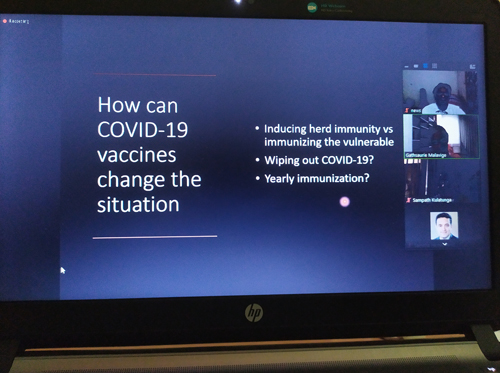COVID-19 could spread due to New Year holidays, schools reopening
 A stark warning was issued this week of another bout of the COVID-19 infection due to the inadequate availability of the vaccine, festivities like Sinhala and Tamil New Year and Vesak approaching and schools reopening.
A stark warning was issued this week of another bout of the COVID-19 infection due to the inadequate availability of the vaccine, festivities like Sinhala and Tamil New Year and Vesak approaching and schools reopening.
This is because large numbers of people converge and the reluctance of the majority of the community to adhere to health guidelines, with the issues emerging partly due to state administrative problems .
The warning transpired at the Sunday Times Business Club monthly webinar titled “Efficacy of COVID-19 Vaccines’ held online on Monday.
The panellists were Prof (Ms) Neelika Malavige, Head of the Department of Immunology, Faculty of Medicine, University of Sri Jayawardenapura and Dr. Nihal Abeysinghe, former Chief Epidemiologist, Ministry of Health.
Dr. Abeysinghe said that over 100 vaccines the world over are on clinical trial and among them 17 are expected to get World Health Organisation (WHO) approval and they were to rollout the vaccine to prevent infections, deaths and further spread of the disease.
He said that with the information that the vaccine would be available they had prepared ‘Vaccine Introduction Plan’. The Planning Committee invited the Advisory Committee on Communicable Disease, of which he is a member and which has a history of about 50 years in guiding the Ministry of Health.
Whatever the manufacturers of the vaccine indicated, the whole world knew that these manufacturers would not be able to supply the total demand and Dr. Abeysinghe pointed out that, which is why some rich countries ordered several times more than their countries’ requirements. “To use on the maximum population with the available vaccine,” he asserted.
He said that unfortunately in Sri Lanka till the last moment the country was relying on various other medicines like the local herbal products, local medicine and then a commotion in the country was erupted and the country was not paying enough attention to place orders forg COVID-19 vaccines. Sri Lanka lagged behind in the case of placing orders, Dr Abeysinghe pointed out and in fact “our orders were made only in January this year”.
He said that the authorities should have really done their homework in ordering the required amount of vaccine, adding that the committee had prepared the “Vaccination Introduction Plan” based on the WHO advice to prepare a prioritisation plan. The WHO clearly advised the whole world how to protect the vulnerable – the frontline health workers, security staff, the elders and then the community.
He said “Our priority experts identified as per WHO advice to define the vulnerable, identifying the persons who are engaged in the control work, essential services and the people clearly wanted us to help us to maintain the daily routine”.
 He said that they prepared the plan and the government negotiated with several countries to obtain the vaccine. The plan was to vaccinate with ‘AstraZeneca’ which can be stored under Sri Lankan conditions and he said that they planned to reach the whole country.
He said that they prepared the plan and the government negotiated with several countries to obtain the vaccine. The plan was to vaccinate with ‘AstraZeneca’ which can be stored under Sri Lankan conditions and he said that they planned to reach the whole country.
“After receiving 500,000 does from India, they still expected the government to follow their plan – to vaccinate as per the Priority List”, he said adding however that “unfortunately halfway through the government decided to change the plan”.
He went on further: “We did not agree, we explained our views but the government continued in their way. There is no way as to find a solution”.
Prof. Malavige said that before finding out the efficacy of the COVID-19 vaccine, she thought of highlighting the importance of vaccinating who and also discussing the issues relating to COVID-19. She said that the chances of these medicines are not fully understood by the public and the definition indicated that immunology is a study of the immune system and it is important to protect the people from various infections of disease – an important branch of health and biological sciences.
She said that people are alarmed as the COVID-19 pandemic is confronted with ‘death’ in serious cases. “Because,” she said, “to date it is severe – even with death”. She said the risk is higher with higher age groups and is important to administer the vaccine to those identified vulnerable people, though the country is not having enough vaccine to go with.
Prof. Malavige stressed that all the countries are concentrating trying to save lives, because of the higher chances of dying. She said to get protection both doses have to be administered. In her opinion, the vaccination would last for over a year and then one may have to get a booster to update their immunity system.



